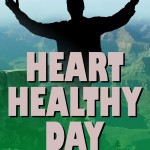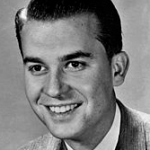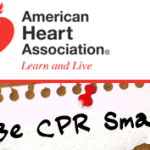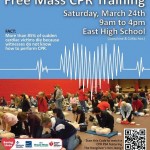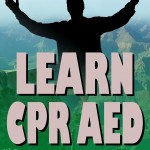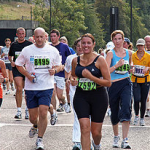
Keith Ahrens
Health tips and discussions, motivational articles and positive lifestyle coaching from Lifestyle Change Expert, Keith Ahrens
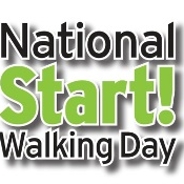 National Start Walking Day is Wednesday, April 6 and always the first Wednesday in April.
National Start Walking Day is Wednesday, April 6 and always the first Wednesday in April.
The time is now to get moving. I couldn’t think of a better place to start than with a nice walk.
Will you walk?
Can you get your office motivated to take a walk during lunch?
What about a planned walk with your family or loved one after dinner?
Perhaps someone you know could use a nice walk. Tell them about the day and walk with them.
The American Heart Association has all the tools on their site for someone to just start walking.
Make it a celebration of fitness.
Make it a day of Heart Health.
CLICK HERE &Visit StartWalkingNow.org to get more information.
Have a Heart Healthy Day, Keith

 The 2011 County Health Study was just published in cooperation with the Robert Wood Johnson Foundation and the University of Wisconsin Population Health Institute.
The 2011 County Health Study was just published in cooperation with the Robert Wood Johnson Foundation and the University of Wisconsin Population Health Institute.
It’s certainly very interesting and relatively easy to disseminate the information.
The studies were broken down into 3 major categories; Programs and Policies, Health Factors, and Health Outcomes.
I encourage you to visit the website CountyHealthRankings.org and learn more about your community and county. Snoop around.
The source of the information is excellent.
CLICK HERE TO GO TO CountyHealthRankings.org
Have an incredibly Heart Healthy Week, Keith
![]()
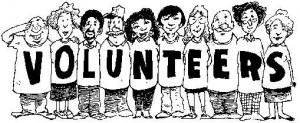 In the past 1-½ years I’ve been able to volunteer a lot. I’ve worked with several fantastic organizations and each and every project enriched my life.
In the past 1-½ years I’ve been able to volunteer a lot. I’ve worked with several fantastic organizations and each and every project enriched my life.
Volunteering is not only a good thing to do for the people who benefit from your involvement but for you as well.
Volunteering has made me healthier and empowered me in so many ways. I relax when I give back. Although some of the projects have been quite challenging and seemingly chaotic at times, I can’t relate any of the activities to a higher stress level but exactly the opposite.
I believe that a persons stress level goes way down when they volunteer.
The great thing about being a volunteer is that you get to pick your projects and causes. Lowering your stress level reduces your blood pressure and certainly helps the heart.
Pick a project, a group, a charity or something close to your heart and give back. It will be the greatest gift you’ve ever given yourself. – Keith
 It’s that time of year again.
It’s that time of year again.
The American Heart Association’s Las Vegas Heart Walk is October 15, 2011 at Mountains Edge Exploration Park.
This year I’m Co-Chair of all the Community Teams with Laurie Waldron and Co-Captain of Team “Outrunning My Shadow”.
Last year Team “Outrunning My Shadow” was the #1 Community Teams Fundraiser. There were 160 teams total.
This year we want to be #1 again. The money raised from the Heart Walk is spent on research for the American Heart Association. Every year, breakthroughs in the science of cardiovascular disease and stroke occur due to our diligent efforts.
I sincerely thank those of you who supported us last year financially and for those who supported us in spirit. Every gift counts, from $5 to $500 my gratitude and heart goes out to you. Please consider giving to the American Heart Association.
As they say at the AHA, “There is no Cure without U”
Thank You, Keith
To Form Your Own Team, Follow The Directions Below. Don’t hesitate to email me with any questions. Keith
Creating a Team for the Heart Walk.
Go to www.lasvegasheartwalk.org
Register
Start a team, join a team, join as individual (pick one)
For starting a team you need to…
Click arrow for Select Company
Then select Community Teams
Select team name
Follow prompts to create personalized page!
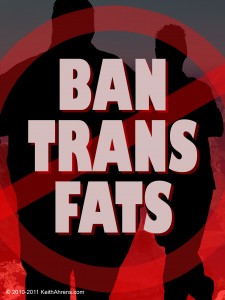 SB230 is coming up for a vote in the Nevada Legislature tomorrow Friday, March 25.
SB230 is coming up for a vote in the Nevada Legislature tomorrow Friday, March 25.
The bill prohibits the sale or provision of foods containing Trans Fats at public schools within this State.
I’m hoping the advocacy work we’ve done and our testimony tomorrow pays off and the bill gets passed.
It will greatly improve the heart health of our children and reduce future medical expenditures for generations to come. – Keith
From the American Heart Association Below:
THE AHA ADVOCATES
The AHA will continue to monitor removal of trans fats from the food supply and assure that healthy replacement oils are used.
• The Association will advocate for legislation and regulation that removes industrially-produced trans fats from food preparation in restaurants and schools and requires that all foods brought in be zero grams of industrially-produced trans fat as labeled.
• The AHA will also address labeling issues to assure that there is accurate information provided to consumers about the actual amounts of trans fats in foods products.
• The AHA will support robust nutrition standards in schools and for foods marketed and advertised to children and strong procurement standards for foods purchased by employers and government feeding programs.
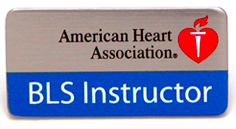 I just received my credential as a BLS Instructor from The American Heart Association.
I just received my credential as a BLS Instructor from The American Heart Association.
BLS stands for Basic Life Support. Many know it as CPR, AED, Choking, & First Aid Training
As a BLS Instructor for the AHA, I can teach new and renewal classes for CPR/AED/Choking/First Aid to Medical Personnel and the General Public throughout the United States.
I’ve strongly advocated that more people need to be trained in proper CPR (Cardio Pulmonary Resuscitation) techniques and the use of an AED (Automated External Deliberator) and now I can help them accomplish this.
Knowing proper techniques and what to do in an emergency saves lives. As frightening as an emergency situation would be – not knowing how to respond would be more frightening and significantly reduce victim’s chances of survival.
You, Yes You, Can Save a Life!
Are you CPR/AED trained? If not, call your local AHA office and find a training center near you. – Keith
Click Here to go to the American Heart Association Page and get more info
 When was the last time you filled out a form?
When was the last time you filled out a form?
Think about when you fill out a medical form, a form for school, an insurance form etc.
What happens when we make a mistake on it?
It gets lost in the shuffle or it gets put to the bottom of the pile.
The bottom line: You don’t get the results in the time frame that you were looking for.
At the gym, I’ve noticed more and more people using bad form when they exercise. All kinds of exercise that is.
It’s so important to use good form on any activity or exercise that we do.
Good form equates to better and faster results.
If you go to a gym, ask for help. Most gyms offer a free session that teaches its members how to use a particular piece of equipment or how to perform certain exercises. Someone should always be happy to show you how to do something the right way.
By doing an exercise or activity with good form you will also greatly reduce the chance of injury.
If you’re exercising at home or trying something new, go to YouTube and look at some reliable videos to see how a certain exercise should be done. Best of all, It’s Free!
Search for the exercise and also type the word “beginner” and see what comes up.
They’re many videos available to show people how to do a proper exercise with good form. I do this when I want to find out about a new lift or new method of exercise.
Try new exercises. mix up your routine. Have fun with whatever you decide to do but do it with proper form and safety. – Keith
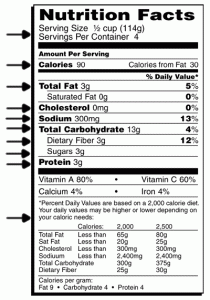 With National Nutrition Month in full swing it seems like the perfect time to get reacquainted with the Nutrition Facts on food labels.
With National Nutrition Month in full swing it seems like the perfect time to get reacquainted with the Nutrition Facts on food labels.
The FDA has a very easy to read Food Label fact sheet.
Click here for Food Label info from the (USFDA) Food and Drug Administration
In recent years I’ve become obsessed with reading food labels.
I simply can’t tell you how many items I pick up in a grocery store, read the label, and put back on the shelf.
When you learn to read labels, it only takes a split second to identify 90{1ee8873d3da54571ef77633feec9b2f18618b0dba2f28faf42edb28003d1c6f7} or more of unhealthy foods and ingredients.
The two primary ingredients that I Zoom In and Zoom Out on are Saturated fat and Sodium. If these two items are out of whack, the item goes back on the shelf. Saturated fat and Trans fats are not healthy fats.
The key with Total fat in a product is the make up of the fat. There are typically 4 possibilities including: Saturated Fat, Trans fat, Mono-unsaturated and Poly-unsaturated fats. In general, the latter of the two being primarily healthy fats.
Make no mistake that our bodies need fats to survive but it’s the type of fats that are either heart healthy or heart destroying.
The goal with the healthy fats is to consume and use them in moderation because of their high caloric content.
If an item has ANY Trans fats put it back on the shelf immediately.
Everything has importance on a food label. Take a close look at sugars, carbohydrates, dietary fibers and protein. Depending on what your nutritional and dietary goals are you’ll pick up certain foods with higher concentrations of certain ingredients.
Learn to read food labels and Learn to Live – Keith
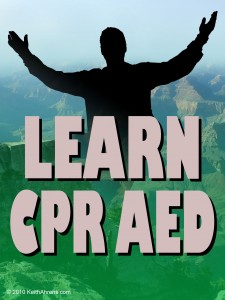 Probably and Perhaps.
Probably and Perhaps.
Another High School athlete passed away in what appears to be another case of Sudden Cardiac Arrest (SCA).
The initial autopsy revealed an enlarged heart.
Click Here To Read Full Article
What we do know is that a routine screening of this athlete may vary well have shown his enlarged heart and flagged his potential risk of SCA. An echocardiogram (Sonar) and/or electrocardiograms (EKG) most likely would have discovered the abnormality.
Why are we caught so off guard when these deaths occur?
While advocating for prevention, awareness, and education programs for heart disease and the screenings of athletes in high school and college sports, I’ve learned that although the early detection tests are simple and easy to administer, they’re simply not routinely performed.
Why? I’ll share a couple reasons I’ve learned.
Cost. Although the cost is very small to have the test(s) performed, the tests must also be read and interpreted by a doctor.
Accessibility. Screenings need to be very accessible and easier to get.
Athletes are afraid that if they admit to having a risk factor (such as a family member with heart disease) they may not be allowed to play. Studies have shown that athletes may not be truthful in answering the most basic risk factor questions.
Statistics are weak at best for the scope of the problem. The facts, I believe, would show this is a much larger problem than we’re aware of.
Routine screenings of groups of athletes regularly identify potential at risk youth.
We need to ask: Should all athletes be screened?
Who should pay for the screenings?
My personal opinion is that every high school and college athlete should be screened. It would logically begin with the students with the most basic primary risk factors such as family history.
How do we get an athlete to tell the truth? If a problem is found, is that the end of the athlete’s sports career? Will they ever be allowed to compete again?
Do we allow doctors to clear someone to compete and relieve the doctor of potential lawsuits if a problem occurs?
One person making a difference and saving lives is my friend Holly Morrell of Heartfelt Cardiac Projects based in California. Her non-profit offers low cost screenings with any abnormal or concerning findings being referred to a physician. She has inevitably saved countless lives with her work.
The one thing I know for sure is that routine screenings save lives. I’ll continue my fight for Awareness, Prevention, and Education of Heart Disease and the related risk factors. – Keith


